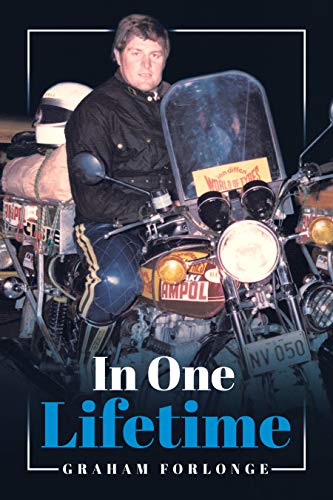In One Lifetime received a 4+ star review, making it an IndieReader Approved title.
Following find an interview with author Graham Forlonge.
What is the name of the book and when was it published?
In One Lifetime published in 2020.
What’s the book’s first line?
In one lifetime, how many people can say they have driven through a crowd of angry, rioting natives, had their vehicle hacked to shreds by axes and bush knives, and survived the ordeal? I can! It happened to me twice, and I lived to tell the tale!”
What’s the book about? Give us the “pitch”.
It is a detailed account of the many traumatic events in my life that ultimately left me with a lifelong case of Post-Traumatic Stress Disorder (PTSD). It outlines what ultimately resulted in my healing to where I am now living a very content and happy life. If I could help just one other person recover from PTSD, then writing this book was worth it.
What inspired you to write the book? A particular person? An event?
In 2005 I started writing the story of my life, accounting the many traumatic events in an endeavor to bring these events to the light and to find some closure by facing the stories.
What’s the main reason someone should really read this book?
There is a way out of PTSD and depression. Suicide in not the answer.
If they made your book into a movie, who would you like to see play the main character(s)?
I am a John Wayne fan, but as he is not available, I will settle for Tom Cruise?
When did you first decide to become an author?
My brother found all these stories I wrote in a box in the shed at my home and helped me put them into order. Being older, he had a lot more knowledge of our childhood and the sequence of those events and he helped me fill in missing bits. My now wife when she read these stories, thought they were too powerful to remain unread and unshared. It took almost two years to get the stories and events accounted into a format that I could give to an editor. My wife helped me put the emotions into the stories and not just the words. There were many parts that I had still not managed to write down and she helped me write those missing parts in as we went through one story at a time. It was like very intense counselling and very healing. We found an amazing Canadian Editor, Rachelle Chartrand, through Upwork. She had such a sensitivity to the stories and did justice to the book. She did not try and change the stories and events
Is this the first book you’ve written?
Yes, and possible the last! It took a lot out of me emotionally. I have become very emotional now but I do not feel bad about showing it at all. I spent my entire life hiding my feelings and emotions. I think I was afraid that if I did reveal them, I would fall apart under the massive burden of the trauma I had experienced. Before we sent the book off to Tellwell for publishing, my wife asked me if I was sure I wanted to put my story out there for the world to see. Yes, I was.
What do you do for work when you’re not writing?
I am retired but I have many duties now supporting my wife’s heavy workload. I also offer free counselling sessions to help other people with depression and PTSD. I did a counselling course as I have so many stories that can relate to other people’s problems. The Professor at St John of God Military Rehabilitation Hospital, when I went for counselling, commented that I had a personal example for almost every topic he brough up. He said that mine is not just book knowledge, but life acquired coping skills
How much time do you generally spend on your writing?
While revising the book, filling in the missing pieces, to get it into a format that could be published, my wife and I sat down most evenings for three to four hours working on the book. I found it very traumatic talking about my life stories at that stage, but I am now so grateful that I managed to persevere as the healing it has brought is amazing. I am very grateful for that. The last word in my book is “COMMUNICATE”.
What’s the best and the hardest part of being an indie?
The hardest part was to not be totally overtaken by emotion. I am very honored that the book received such a great rating and the comments are humbling but also insightful. It was not written to receive any accolades but it is great to have the book recognized. I hope this helps to put the book out there as a healing tool.
What’s a great piece of advice that you can share with fellow indie authors?
Keep at it Mate! Keep it truthful and real no matter how hard it is to tell your story. Getting the book edited and published was not all that easy either as we did not know where to start. Now we have the knowledge to recommend a good place to find an Editor and a good Publisher!
Would you go traditional if a publisher came calling? If so, why?
I am always open for a discussion, so I cannot answer yes or no to this question.
Is there something in particular that motivates you (fame? fortune?)
My desire to be of benefit and help others who suffer from PTSD and depression. The love of my wife, family and my faith are the very foundation of my life now.
Which book do you wish you could have written?
The Jack Reacher book series by Lee Child! Just love them!

